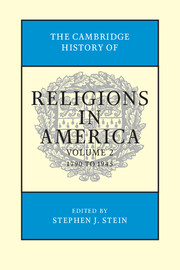Book contents
- Frontmatter
- Contents
- Contributors
- Editor's Introduction
- SECTION I RELIGION IN NORTH AMERICA
- 1 Religious Diversity in the 1790s
- 2 Religion and the Constitutional Tradition
- 3 Religion and Law in British North America, 1800–1867
- 4 Mexican American Faith Communities in the Southwest
- SECTION II RELIGIONS IN THE NEW NATION, 1790–1865
- SECTION III CHANGING RELIGIOUS REALITIES
- SECTION IV RELIGIOUS RESPONSES TO MODERN LIFE AND THOUGHT
- SECTION V COMPARATIVE ESSAYS
- SECTION VI RELIGION AND DIVERSE AREAS
- Index
- References
1 - Religious Diversity in the 1790s
from SECTION I - RELIGION IN NORTH AMERICA
Published online by Cambridge University Press: 28 July 2012
- Frontmatter
- Contents
- Contributors
- Editor's Introduction
- SECTION I RELIGION IN NORTH AMERICA
- 1 Religious Diversity in the 1790s
- 2 Religion and the Constitutional Tradition
- 3 Religion and Law in British North America, 1800–1867
- 4 Mexican American Faith Communities in the Southwest
- SECTION II RELIGIONS IN THE NEW NATION, 1790–1865
- SECTION III CHANGING RELIGIOUS REALITIES
- SECTION IV RELIGIOUS RESPONSES TO MODERN LIFE AND THOUGHT
- SECTION V COMPARATIVE ESSAYS
- SECTION VI RELIGION AND DIVERSE AREAS
- Index
- References
Summary
The religious landscape of the 1790s was widely diverse. Religious groups fleeing persecution in Europe, African traditions that had survived the Middle Passage, a variety of Native American religious forms, religion brought to North American shores by persons seeking commercial success or otherwise aspiring to social and political achievement, and a rising tide of Enlightenment-derived criticism of religion made the 1790s a decade of contrasting religious styles, contested spaces, and sharply framed arguments. In the new nation, under the banner of religious freedom and separation of church and state, religion flourished in a multitude of cultural settings and in an abundance of practices, some formal, others informal. Debates about religious ideas were common, and experimentation with practices was in evidence everywhere. There sometimes was friction between religious groups. There also was a determination to overcome differences in making an American polis. Most importantly, religion in the United States at the end of the eighteenth century was complex and fluid, sometimes defined within traditional institutional structures and sometimes represented by detailed networks of occult religious ideas, arcane practices, magic, folk wisdom, and supernatural lore that was passed on from generation to generation outside the channels of ecclesiastical communications.
The religious lives of many Native Americans were in flux in 1790. The massive depopulation of indigenous peoples from disease and the practical consequences of the relentless expansion of Euro-American cultures into tribal territories diminished the capability of Native Americans to resist adaptation.
- Type
- Chapter
- Information
- The Cambridge History of Religions in America , pp. 1 - 25Publisher: Cambridge University PressPrint publication year: 2000



